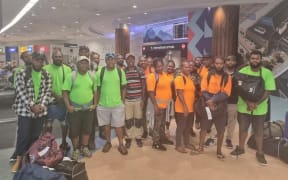
The RSE scheme has a cap this year of 19,000 workers (file picture). Photo: RNZI / Johnny Blades
Three seasonal workers from the Solomon Islands say their weekly wages were sometimes reduced to zero by deductions they claim were unlawful.
Lyn Soapi, Danny Lau and Mary Lau have filed a lawsuit against their employer, Pick Hawke's Bay Incorporated, seeking arrears of pay.
Their case is due to be heard in the Employment Court late this year or early in 2024.
The outcome of it will potentially set a precedent not only for seasonal workers from overseas but others on minimum wage.
For this reason, the Employment Court has decided to hear the case directly, instead of waiting for it to be heard first by the Employment Relations Authority.
Now, a further decision from the court has allowed the Human Rights Commission and the Council of Trade Unions to join the matter as "interveners". They will be able to make submissions to the court on the issues raised, but not call evidence.
Pick Hawke's Bay is a non-profit organisation which employs workers under the Recognised Seasonal Employer (RSE) scheme, which brings in workers from overseas to fill demand in the horticulture and viticulture industries.
According to its own rules, Pick Hawke's Bay aims to "promote best practice" in those industries and ensure that workers are adequately paid.
However, Lyn Soapi and Danny and Mary Lau, who all worked here in the 2018-2019 season and some of the years on either side, say that the organisation unlawfully deducted expenses from their wages for such costs as transport, food, clothing and storage.
They say that these deductions were not authorised by Immigration New Zealand, which has oversight of the RSE scheme, and were unlawful under either the Wages Protection Act or Minimum Wage Act, or were in breach of health and safety law.
However, Pick Hawke's Bay denies it has acted either in breach of the law or the workers' employment agreements.
The three workers, through their lawyer Tim Oldfield, said legislation created a code which had been breached by the deductions imposed by Pick Hawke's Bay.
"The claimed breach arose because, for several weeks after they began work [each season], the amounts deducted for accommodation and other costs reduced what the plaintiffs were actually paid, in some cases, to nothing," according to a decision on preliminary matters issued by Judge Kerry Smith.
"Those deductions continued until such time as their income wiped out the deficit created by the expenses they incurred."
In the latest hearing, Pick Hawke's Bay applied to impose security for court costs on the workers, who are all currently outside New Zealand.
It sought a $2000 bond from each of the plaintiffs, and a stay of proceedings until the money was paid.
Judge Smith turned these requests down.
Among their claims, the workers say that deductions were made for work and wet weather gear, which their employer was required to provide as "personal protective equipment" under the Health and Safety at Work Act.
They also claimed that they did not receive at least the minimum wage for their work at the beginning of each season because of deductions that had been made.
All three of the workers are seeking arrears of wages, plus interest. Lyn Soapi and Mary Lau are also seeking penalties.
Pick Hawke's Bay president John Evans argued that the deductions had been approved by Immigration NZ, or consented to by the workers and that the amounts involved were "very small and capable of resolution without litigation".
Pick Hawke's Bay said that the claims in respect of the Minimum Wage Act were "misconceived" because the deductions were made for lawful purposes.
It told the court that an employer may make lawful deductions from wages, even if that reduced what is received by the employee to below the minimum wage, where the intent was to meet statutory or other legal obligations.
In this case, that requirement was to satisfy a contractual commitment over the costs of accommodation.
Deductions for work and wet weather gear were just over $800.
"The defendant's response was that the amount was modest and the claim weak," Judge Smith said.
"Where the claim relates to duties under the Health and Safety at Work Act 2015, it was criticised as being beyond the jurisdiction of this court."
The RSE scheme has a cap this year of 19,000 workers. They are given temporary visas and are expected to return home between seasons.





